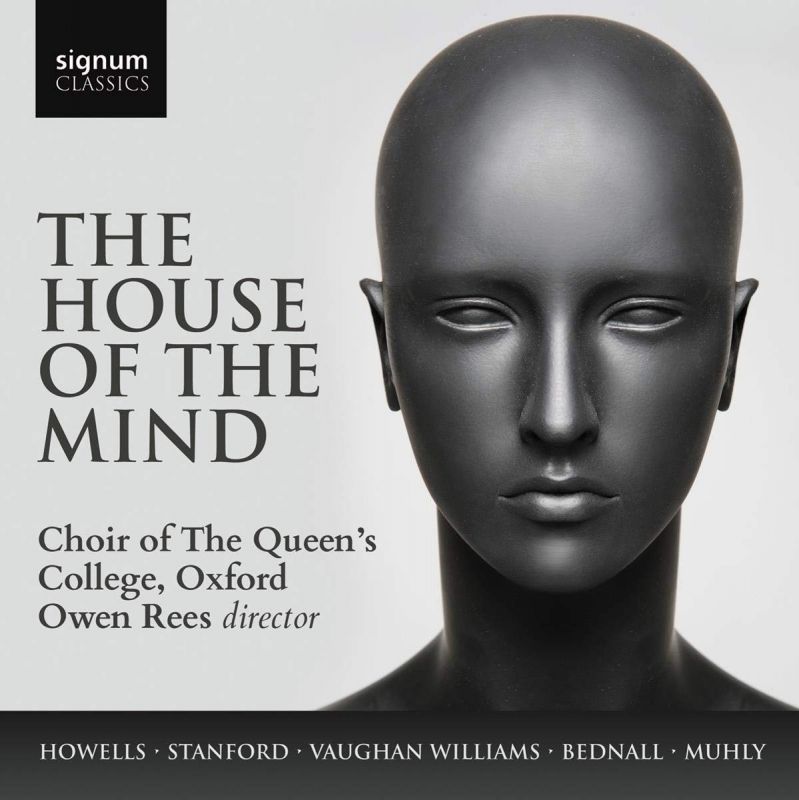The House of the Mind
View record and artist detailsRecord and Artist Details
Composer or Director: David Bednall, Herbert Howells, Ralph Vaughan Williams, Nico Muhly, John Scott, Patrick (Arthur Sheldon) Hadley, Charles Villiers Stanford
Genre:
Vocal
Label: Signature
Magazine Review Date: 09/2018
Media Format: CD or Download
Media Runtime: 66
Mastering:
DDD
Catalogue Number: SIGCD491

Tracks:
| Composition | Artist Credit |
|---|---|
| Alma redemptoris mater |
David Bednall, Composer
David Bednall, Composer Owen Rees, Conductor Oxford Queen's College Choir |
| Ave regina caelorum |
David Bednall, Composer
David Bednall, Composer Owen Rees, Conductor Oxford Queen's College Choir |
| O Lord I am not haughty |
David Bednall, Composer
David Bednall, Composer Owen Rees, Conductor Oxford Queen's College Choir |
| My beloved spake |
Patrick (Arthur Sheldon) Hadley, Composer
Matthew Gibson, Organ Owen Rees, Conductor Oxford Queen's College Choir Patrick (Arthur Sheldon) Hadley, Composer |
| Behold, O God Our Defender |
Herbert Howells, Composer
David Bednall, Composer Herbert Howells, Composer Owen Rees, Conductor Oxford Queen's College Choir |
| God be in my head |
Herbert Howells, Composer
Herbert Howells, Composer Owen Rees, Conductor Oxford Queen's College Choir |
| (The) House of the Mind |
Herbert Howells, Composer
David Bednall, Composer Herbert Howells, Composer Owen Rees, Conductor Oxford Queen's College Choir |
| (A) Hymn for St Cecilia |
Herbert Howells, Composer
Herbert Howells, Composer Matthew Gibson, Organ Owen Rees, Conductor Oxford Queen's College Choir |
| Like as the hart |
Herbert Howells, Composer
Herbert Howells, Composer Matthew Gibson, Organ Owen Rees, Conductor Oxford Queen's College Choir |
| Regina caeli |
Herbert Howells, Composer
Herbert Howells, Composer Owen Rees, Conductor Oxford Queen's College Choir |
| Salve Regina |
Herbert Howells, Composer
Herbert Howells, Composer Owen Rees, Conductor Oxford Queen's College Choir |
| Behold, O God our defender |
John Scott, Composer
John Scott, Composer Owen Rees, Conductor Oxford Queen's College Choir |
| Lighten our darkness |
Charles Villiers Stanford, Composer
Charles Villiers Stanford, Composer David Bednall, Organ Owen Rees, Conductor Oxford Queen's College Choir |
| (The) souls of the righteous |
Ralph Vaughan Williams, Composer
Owen Rees, Conductor Oxford Queen's College Choir Ralph Vaughan Williams, Composer |
Author: Alexandra Coghlan
Music director Owen Rees cannily harnesses this (or rather, perhaps, refuses to harness it) in repertoire that celebrates that particular quality – repertoire where sincerity and gesture are more important than fastidious detail. Where Rees’s superb professional consort Contrapunctus focus on polyphony, with his student singers the emphasis is firmly on 20th- and 21st-century works – works, however, that ignore the more progressive developments in choral music in favour of the tonal, the useable, the nostalgic.
‘The House of the Mind’ is only the third release in the choir’s relatively new collaboration with Signum but it’s the one that makes sense of the ensemble’s musical narrative. A musical prequel, this collection of British anthems by Vaughan Williams, Howells and Stanford fills out the stylistic back story to the more recent works by David Bednall, James MacMillan, Cecilia McDowall and Gabriel Jackson the choir have already recorded (6/17). The addition of more recent works here – more Bednall, John Scott, Nico Muhly – stresses the close kinship between the two generations.
The result is a thoroughly pleasant recording but one where musical particularities are at risk of dissolving into a jewel-coloured wash of competently produced sounds. Only Muhly’s Like as the hart feels like a change of pace, owing to the cosmetic addition of a solo violin and percussion. Otherwise we’re rooted in a modal, chant-infused, John Piper-illustrated world of post-war spirituality that muses and ponders but never really grapples with the knottier questions raised by some of the texts set here – whether Joseph Beaumont’s ‘The House of the Mind’ (set by Howells, and losing a little dramatic impetus through its 10-minute span) or Ursula Vaughan Williams’s ‘A Hymn for St Cecilia’.
Affirmation is all very well but it needs the spice, the friction of fear and doubt to bring it into focus.
Discover the world's largest classical music catalogue with Presto Music.

Gramophone Digital Club
- Digital Edition
- Digital Archive
- Reviews Database
- Full website access
From £8.75 / month
Subscribe
Gramophone Full Club
- Print Edition
- Digital Edition
- Digital Archive
- Reviews Database
- Full website access
From £11.00 / month
Subscribe
If you are a library, university or other organisation that would be interested in an institutional subscription to Gramophone please click here for further information.




